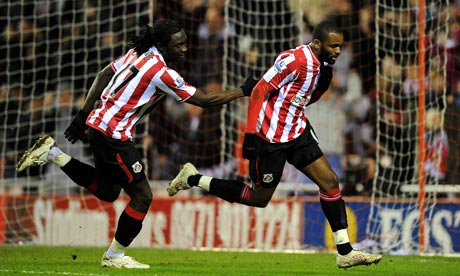
Niall Quinn, the Sunderland chairman, has called for the Premier League to restrain spending on players' wages after revealing that his club made a £26m loss for the last financial year.
Quinn said all the clubs should agree before the start of every season to spend an agreed, reasonable proportion of their income on wages, and that the Premier League centrally should have the power to impose sanctions, including points deductions and even expulsion, on clubs that serially overspend.
"There should be some sort of disclosure of where your wages are at, prior to the year ahead," Quinn said. "A percentage of how much you have coming in and what you are spending on wages. At least then every club is telling the chairman of the Premier League: 'This is where we hope to be, this is our business plan,' so nobody has gone off the wall on their own.
"If it looks excessive, the Premier League chairman should have the power to say: we as a group are not happy, be careful, you are coming into a red area here. Maybe let clubs do it one year, but if you do it for the third year in the row, you are docked points and you are out of here."
Quinn also voiced support for Uefa's Financial Fair Play initiative, which will be phased in for clubs in European competition from 2012-13, requiring them to break even, not make losses, over a financial year. He argued the controls should apply to Premier League clubs.
"Wouldn't it be better if it was put in beforehand and clubs had to work to that budget," Quinn said of the break-even requirement, "rather than put in as a loss, and the owner had to put [in the money]? Do it before the case, not after you are in trouble."
Quinn's arguments have added personal force given the scale of losses Sunderland will declare when the 2008-09 accounts are published imminently. The club expects to make a similar loss, a further £26m, over the current year to 31 July 2010. Those combined losses will be principally due to spending on signings such as Darren Bent and Michael Turner, and servicing an increased wage bill of £50m.
Quinn said that the rise in spending is being bankrolled by the club's owner, the US private equity magnate Ellis Short, who is now based in London. Short, Quinn said, has invested £77m in Sunderland. It is a measure of how inflated wages have become that for so massive an outlay by Short, Sunderland currently sit 13th in the Premier League.
The club spent £64.6m on wages last year. As a proportion of the club's income this was 78%, exactly the same percentage as that in the most recently published accounts at Portsmouth, who have been declared insolvent and gone into administration.
Quinn argued that Sunderland's position is much more secure because Short has put his money in for shares in the club, not as loans, and he is prepared to continue to invest for the club to progress.
"Ellis has put a hell of a lot of money into the football club and the fans need to know he has an emotional attachment," Quinn said. "He came here in the first place I think because he could not believe that this team was never out of the bottom five [last season], had not won a trophy since 1973 and hadn't won one since before the war before that – and they were getting a bigger home crowd than Liverpool.
"Ellis would not have come here if we had 18,000 fans every week. He is here because of the potential; he wants the asset to grow and he feels in five to ten years, that asset will be worth far more. He feels it will be good value in time."

